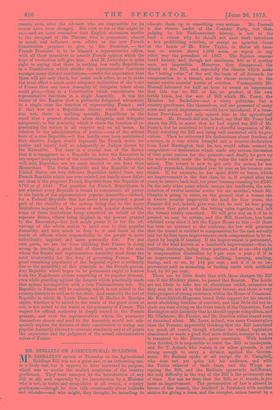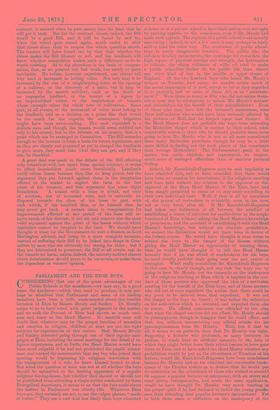educate them up to something very serious. Mr. Disraeli is
the chosen leader of the Country Party, but that, judging by his Parliamentary history, is not in the least a reason why he should not next week introduce a law prohibiting eviction, or accept an agrarian clause at the hands of Mr. Peter Taylor, or throw all taxa- tion on estates above 1,000 acres, or repeat in any other way the precedent of 1867. The Squires remem- bered history, and though not mutinous, felt as if mutiny were not impossible. Moreover, they disapproved the details of the Bill, and especially the clauses which make the " letting value " of the soil the basis of all demands for compensation to a tenant, and the clause securing to the tenant twelve months' notice of eviction. Consequently Mr. Disraeli laboured for half an hour to create an impression that this was no Bill of his, no product of his own fertile brain, but the sort of Bill which Mr. Pusey, the Member for Berkshire—not a viewy politician, but a country gentleman like themselves, and one possessed of many acres and much experience—would have introduced, if a bene- ficent Providence had only spared him to the agricultural interest. Mr. Disraeli did not, indeed, say that Mr. Pusey had drawn the Bill, or assert that he had copied any Bill of Mr. Pusey's, but he contrived to leave a cheerful impression of Mr. Pusey watching the Bill and being well contented with its pro- visions. Then he reiterated his declarations about freedom of contract, in a way which brought out a counter-declaration from Lord Hartington that he, too, would refuse consent to compulsion—a declaration which made any serious discussion of that point useless for the present—and finally he gave up the words which made the letting value the basis of compen- sation. The tenant is now to get only the money he has actually expended, diminished year by year as his tenancy con- tinues. If, for example, he has spent £500 on barns, which are improvements in the first class, he is, if evicted after ten years, to receive back half, ten years' tenancy counting for £250. On the only other point which annoys the landlords, the sub- stitution of twelve months' notice for six months', which Mr. Chaplin is going to resist, on the ground that a tenant can in twelve months impoverish the land for four years, the Premier did not, indeed, give way, but he said he was going to notice that point and the letting value together, and left the former totally unnoticed. He will give way on it if he is pressed, we may be certain, and the Bill, therefore, has been whittled away since it left the Upper House to this :—If there has been no contract to the contrary, the law will presume that the tenant is entitled to compensation for the cash actually laid out by him upon improvements, such compensation to be re- duced by length of tenancy. If the improvement is permanent, and of the kind known as a landlord's improvement—that is, building, drainage, laying down pasture, and so on—the right to compensation diminishes by 5 per cent. a year ; if it is an improvement like boning, chalking, burning, marling, liming, and so on, by 144- per cent. ; and if it is an im- provement such as manuring, or feeding cattle with artificial food, by 50 per cent.
There can be little doubt that with these changes the BM can, if the Ministry please, be passed this Session. The Lords are not likely to take fire at alterations which, extensive as they may be, are all in the landlords' favour, and there is very little prospect of strong resistance within the House of Commons. Mr. Knatchhbull-Hugessen found little support for his amend- ment abolishing freedom of contract, and that little did not in- clude any man sitting on the front bench of the Opposition. Lord Hartington said distinctly that he should oppose compulsion, and Mr. Gladstone, Mr. Forster, and Mr. Goschen either stayed away or remained silent. Mr. Lowe, indeed, was more Conservative than the Premier, apparently thinking that the Bill interfered too ranch all round, though whether he wished legislation abandoned or made a good deal more definite, remains to us, as it remained to Mr. Disraeli, quite uncertain. With leaders thus divided, it is impossible to resist the Bill as inadequate, and Sir T. Acland, who resists it on other grounds, is not MR. DISRAELI ON AGRICUL URAL HOLDINGS. strong enough to carry a division against the Govern- MR. DISRARTJ'S speech of Thursday on the Agricultural meat. No Radical spoke at all except Sir G. Campbell, Holdings Bill was not a great one, or an interesting one, who does not yet quite hit his audience, and with or a lively one, but it appears to have answered its purpose, the Tories relieved of their fears, and the Whigs ac- which was to soothe the excited suspicions of the country cepting the Bill, and the Radicals apparently indifferent, gentlemen. They were annoyed by the introduction of any the only difficulty in the way of the Bill is the permanent one Bill at all, and especially by its introduction by a Minister of time. Nor can we deny that the Bill, as it stands, is pro who is not, in tastes and sympathies at all events, a country tanto an improvement. The presumption of law is altered in gentleman—though he does talk occasionally about bullocks favour of the tenant, the landlord is furnished with another and oil-cake—and who might, they thought, be intending to motive for giving a lease, and the occupier, unless barred by a
contract, is assured when he puts money into the land, that he will get it back. But for the contract clause, indeed, the Bill would be a good Bill, and it will be found by and by, when the wheel goes round again, much easier to alter that clause alone than to reopen the whole question afresh. The tenants will have found out by that time whether the clause makes the Bill illusory or not, and the landlords will know whether compulsion makes such a difference as to be worth resisting. As to the alteration in the basis of compen- sation, that, as we pointed out last week, was nearly or quite inevitable. No valuer, however experienced, can always tell why land is. increased in letting value. Not only may it be increased by the rise of a neighbouring town, or the opening of a railway, or the discovery of a mine, but it may be increased by the merest accident, such as the death of an unpopular landlord, or the receipt of a legacy by an impoverished owner, or the importation of tenants whose example raises the whole tone of cultivation. Some part, at all events, of the increment of value must belong to the landlord, and as a decision on a point like that would be too much for the experts, the consequent litigation might have been never-ending. The cash expended is a definite sum, and though the tenant would seem entitled not only to his money, but to the interest on his money, that is a point which can be arranged in Committee. The Bill concedes enough to the tenants to form a basis for future legislation, and as they are clearly not prepared as yet to compel the landlords to give more, they must take what they can get, and if they can, be thankful.
A great deal was made in the debate of the Bill affecting only tenants-at-will, but apart from special contract, it seems to affect leaseholders much more beneficially. Landlords really refuse leases because they like to keep power, but the argument they put forward against them is the temptation offered to the tenant to neglect the farm in the last years of his tenancy, and this argument has some slight foundation. A tenant with a lease is afraid, not only of eviction, but of increased rent, and is naturally in- disposed towards the dose of his lease to part with cash which, if his landlord dies, or he himself dies, he may never get back. A certain claim to compensation for improvements effected at any period of the lease will re- move much of his distrust, if not all, and remove also the most valid argument against the grant of the leases without which capitalists cannot be tempted to the land. We should have thought it wiser for the Government to wait a Session, as Lord Hartington advised, and bring in a more complete measure, instead of suffering their Bill to be licked into shape in Com- mittee by men who are obviously too strong for them ; but if they are determined to persevere, the Bill at all events can do the tenants no harm, unless, indeed, the scarcely-noticed clauses about deterioration should prove to be too severe, or make them too dependent on valuers' opinion.



































 Previous page
Previous page